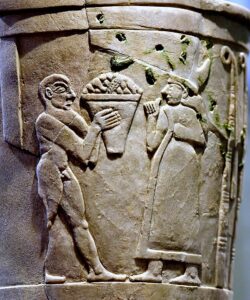
Inanna receiving offerings on the Uruk Vase. By Osama Shukir Muhammed Amin FRCP(Glasg), CC BY-SA 4.0, https://commons.wikimedia.org/w/index.php?curid=92723619
Diane Wolkstein’s Inanna–Queen of Heaven and Earth is a retelling, with commentary, of one of the major texts about the Sumerian goddess Inanna. This is a difficult book for me to review. I could not possibly be more in sympathy with its aims. As a historian of religion, I find ancient mythology a fascinating and important window into the ancestral soul. The mythological gods and goddesses come alive for me, for they are not simply fictional characters, but the embodiments of human fear, anxieties, hopes and passions. Their stories are alive with the multi-level shimmer of poetry and myth, telling the tales of one people, but reverberating with the subconscious of all humanity. Further, there are two ancient peoples to whom I, as a cultural historian, especially resonate—to whose culture I am most attuned, whose ideas fascinate and intrigue me: ancient Israel and the ancient peoples of southern Iraq, the Sumerians first and the Babylonians who followed. To me the Sumerians are alive, and I believe that they not only taught us many lessons at the start of out history five thousand years ago, but that the rediscovery of the Sumerians can continue to infuse our culture with their ancient ideas.
Read the rest of Inanna—The Quintessential Femme Fatale in the online Biblical Archaeology Society Library.